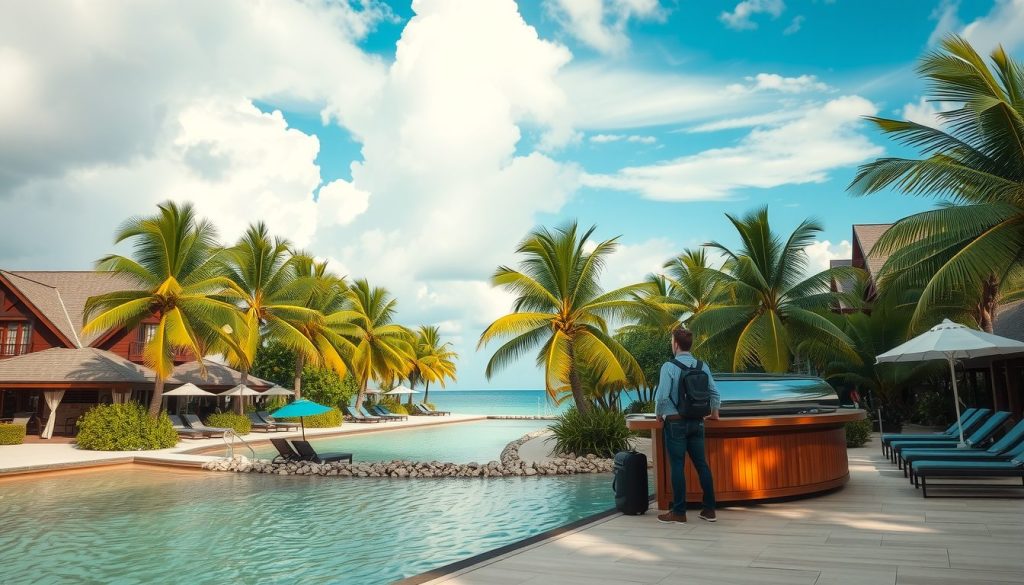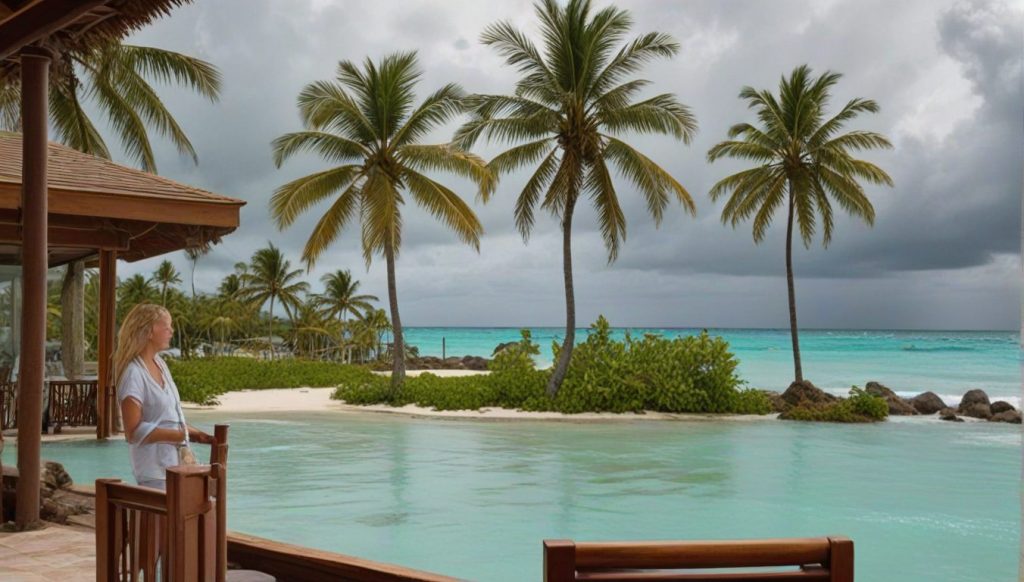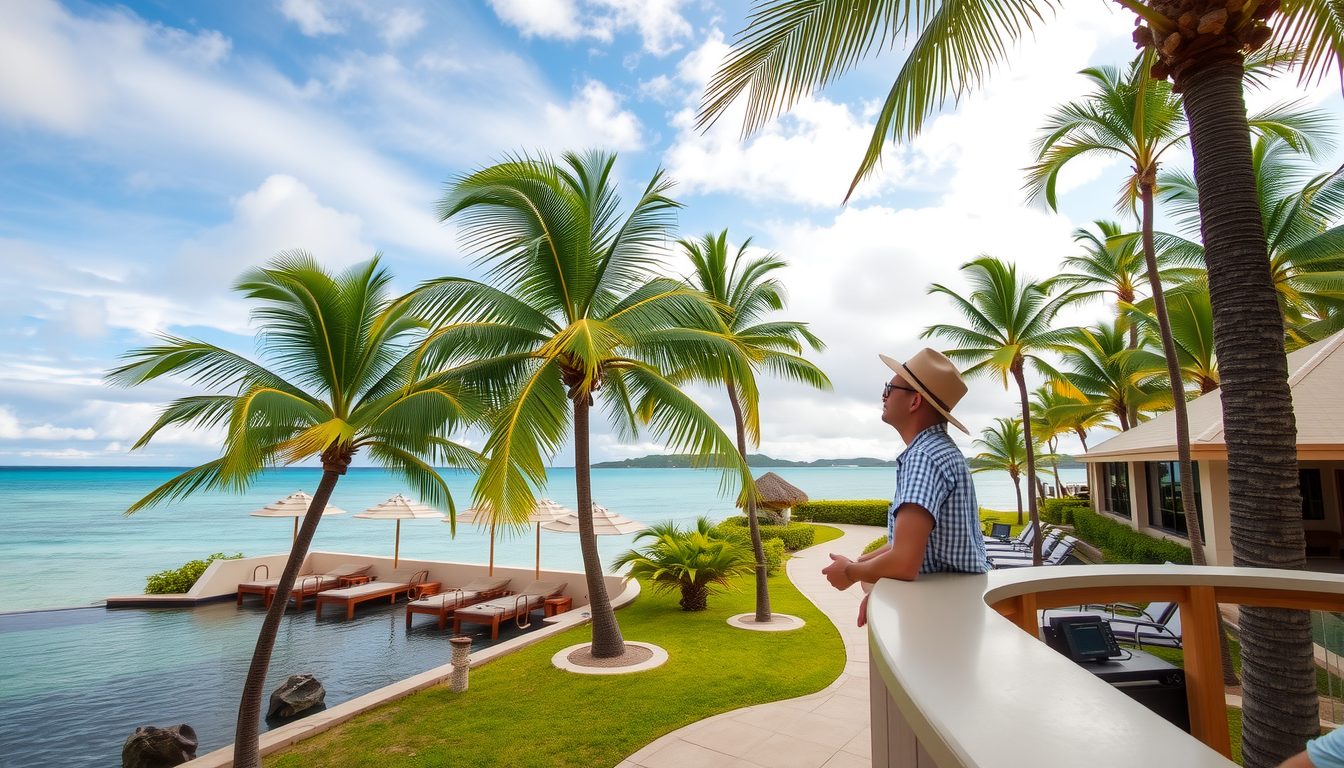Caribbean weather is breathtaking—but it can turn on a dime.
A single storm can unravel months of planning and thousands in prepaid resort nights.
But you’re not powerless.
With the right insurance, flexible bookings, and written hurricane guarantees, you can turn disruption into a refund or a fresh set of dates.
This guide shows how to protect your investment, act fast, and use proven providers to stay in control.
Understand Resort Weather Policies Before They Cost You Your Vacation
Resorts in hurricane‑prone regions know storms are part of the travel landscape, but their policies vary dramatically.
Some offer “hurricane guarantees” that let you reschedule without penalty if a named storm is forecast to hit.
Others issue credits for unused nights or allow rebooking within a year.
A few may only refund if the property officially closes.
The difference between salvaging your trip and losing thousands often comes down to whether you asked the right questions before booking.
Always request the policy in writing.
Resorts like Sandals, Disney, and Palace Resorts publish clear hurricane guarantees, but smaller properties may not.
If you don’t confirm in advance, you may find yourself stuck with nonrefundable nights when the forecast turns.
- Hurricane guarantees: Waive penalties if a named storm is forecast.
- Credits or certificates: Many resorts issue vouchers for unused nights.
- Reschedule windows: Some allow rebooking within 12 months.
- Written proof: Always request the policy in writing.

Book Flexible Options That Keep You in Control When Weather Turns
Flexibility is your safety net.
Nonrefundable rates may save a few dollars upfront, but they lock you into brittle plans.
Refundable or change‑friendly bookings give you the power to pivot when forecasts shift.
Booking direct with the resort often unlocks more generous reschedule terms than third‑party platforms like Tripadvisor or Booking.com.
Some resorts also sell “vacation protection plans” that allow last‑minute rescheduling.
The smartest move is to combine flexible bookings with hurricane guarantees so you’re covered from both sides.
Think of it as buying optionality: you’re paying for the right to change your mind when the weather demands it.
- Direct bookings: Resorts often offer more generous reschedule terms.
- Third‑party bookings: Must follow platform rules, often stricter.
- Vacation protection plans: Add‑ons that allow last‑minute rescheduling.
- Documentation: Save confirmations and policy details.
Travel Insurance That Turns Storms Into Refunds
Even with resort flexibility, insurance is the backbone of storm protection.
Standard policies cover trip interruption or cancellation if a storm makes your destination uninhabitable.
Cancel for Any Reason (CFAR) coverage goes further, letting you back out even if the resort remains open.
Without insurance, you’re relying entirely on resort goodwill.
With it, you have a contractual right to reimbursement. Insurance transforms weather from a financial threat into a manageable inconvenience.
Below are the four providers that cover the most critical gaps — each one plays a different role in protecting your trip.

VisitorsCoverage — Shield Your Prepaid Resort Nights
When a storm forces a resort to close, prepaid nights can vanish without protection.
VisitorsCoverage is designed to shield that investment.
It’s a marketplace that lets you compare multiple carriers and find policies with explicit closure/interruption language.
If you’ve prepaid thousands for an all‑inclusive stay, this is the module that ensures you don’t lose it all when the resort shutters.
- What it is: Marketplace for cancellation, interruption, and medical policies with closure riders.
- Why recommended: Efficient comparison of closure/interruption language and per‑night caps.
- How to buy: Run quotes, select closure riders, purchase digitally, save hotline.
- Decision filters: Explicit closure clause; per‑night caps; documentation requirements.
Ekta — Secure Peace of Mind With Medical and Evacuation Protection
Storms don’t just disrupt flights and resorts — they can create medical emergencies.
If you’re injured or fall ill during a hurricane, local hospitals may be overwhelmed or under‑equipped.
Ekta specializes in high medical limits, evacuation coordination, and guaranteed hospital payments.
This is the provider that ensures you’re not left negotiating costs in a crisis, and that you can be moved quickly to a facility that can handle your needs.
- What it is: Global insurer specializing in medical coverage and evacuation.
- Why recommended: High medical limits and guaranteed payment reduce risk.
- How to buy: Purchase via portal or broker, register travelers, store hotline contacts.
- Decision filters: Medical limits, evacuation caps, activity coverage.
Insubuy — Transform Delays Into Covered Comfort Instead of Stress
Flight delays are inevitable during storm season, but they don’t have to mean sleeping on airport floors.
Insubuy is a broker that simplifies sourcing delay and interruption riders across carriers.
It clarifies per‑day caps and delay triggers, and provides licensed agent support for claims.
With the right rider, you’ll be reimbursed for meals and hotels during delays, and refunded for unused nights if you must cut a trip short.
- What it is: Broker for delay and interruption riders across carriers.
- Why recommended: Clarifies per‑day caps and delay triggers; agent support for claims.
- How to buy: Compare riders, purchase, download documents, note claim timelines.
- Decision filters: Minimum delay hours; per‑day hotel/meal caps; reporting requirements.
Compensair — Claim the Airline Cash You Deserve After Disruption
Airlines owe compensation for delays, cancellations, and denied boarding — but most travelers never claim it.
Compensair specializes in recovering this money, separate from insurance reimbursements.
By submitting your boarding passes, cancellation notices, and receipts, you can unlock cash that airlines are legally obligated to pay.
This is the final layer of your protection stack, ensuring you don’t leave money on the table.
- What it is: Service that pursues airline compensation for delays/cancellations.
- Why recommended: Recovers statutory or contractual payouts separate from insurance.
- How to buy: Submit disruption evidence online; retain boarding passes, notices, receipts.
- Decision filters: Route eligibility; required documentation; filing deadlines.
Act Quickly When Weather Threatens to Save Your Options
Resorts and insurers often require action within a set window (e.g., 72 hours before arrival).
Waiting until the storm makes landfall is too late — by then, flights are full, resorts are overwhelmed, and claims may be denied.
The moment a hurricane warning is issued, call your resort, reference their hurricane policy, and request written confirmation of your reschedule or credit.
At the same time, notify your insurer.
Acting early preserves your options and keeps you ahead of the panic.
- Contact resort first: Ask to reschedule or receive a credit.
- Call insurer hotline: File a claim if coverage applies.
- Keep records: Save emails, advisories, and receipts.
- Move early: Acting before the storm hits preserves options.
Real‑World Scenarios That Prove Rescheduling Works
It’s one thing to talk about policies and protections in theory — it’s another to see them in action.
Real travelers have faced storms that forced cancellations, evacuations, and mid‑trip closures.
The difference between panic and control came down to whether they had flexible bookings and the right insurance stack.
These scenarios illustrate how preparation turns chaos into confidence, showing exactly how each protection module plays out in practice.

- Couple at Sandals: A hurricane warning was issued three days before arrival. They rescheduled to new dates without penalty under the resort’s hurricane guarantee.
- Family in Puerto Rico: Resort closed mid‑stay due to power outages. They received a credit for unused nights and rebooked within six months.
- Solo traveler with CFAR insurance: Forecast showed a storm approaching. Even though the resort stayed open, CFAR coverage reimbursed 75% of prepaid costs when they canceled.
FAQ – Reschedule Your Caribbean Resort Stay Without Losing Money
Do all Caribbean resorts let me reschedule if a storm is coming?
Most resorts in hurricane-prone regions have weather policies, but they vary widely.
Some offer hurricane guarantees that waive penalties if a named storm is forecast.
Others may issue credits for unused nights or allow rebooking within a set window.
A few only refund if the property officially closes.
Always request the policy in writing before booking to avoid nonrefundable losses.What if I booked through a third-party site like Tripadvisor or Booking.com?
Third-party bookings must follow the platform’s rules, which are often stricter than direct bookings.
You’ll need to cancel or reschedule through the platform, not the resort.
This can limit flexibility, especially during weather disruptions.
Booking direct with the resort often unlocks more generous reschedule terms.Does travel insurance cover rescheduling due to hurricanes?
Standard travel insurance covers cancellations or interruptions if a storm makes your destination uninhabitable.
Cancel for Any Reason (CFAR) coverage goes further, allowing you to cancel even if the resort remains open.
Insurance gives you a contractual right to reimbursement, not just resort goodwill.
Without it, you risk losing prepaid costs if the resort won’t refund.How soon should I act if a hurricane is forecast?
Act immediately when a hurricane warning is issued.
Resorts and insurers often require action within 72 hours of the alert.
Waiting until landfall may leave you with no options and denied claims.
Call your resort to request rescheduling or credits, and notify your insurer at the same time.Can I get a refund instead of rescheduling my Caribbean resort stay?
Some resorts offer refunds, but many prefer credits or rebooking options.
Sandals, Disney, and Palace Resorts publish hurricane guarantees that allow penalty-free changes.
If you want cash back, travel insurance is your best path.
CFAR coverage reimburses a percentage of prepaid costs even if the resort stays open.
